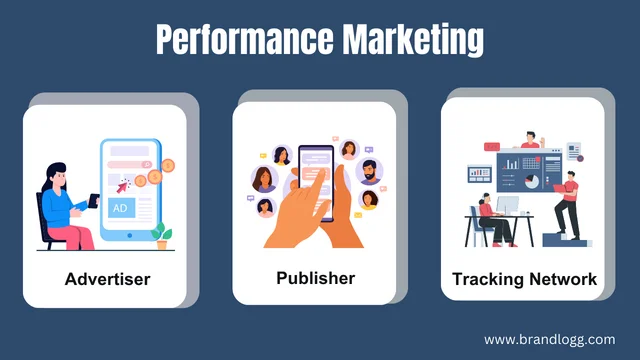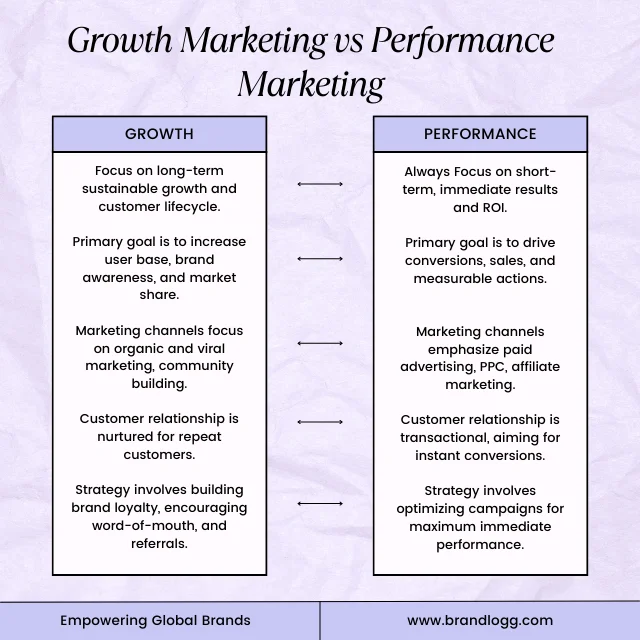Table of contents
- What is Performance Marketing?
- Growth Marketing vs. Performance Marketing: Understanding the Distinct Approaches
- The Core Components of Performance Marketing
- The Benefits of Performance Marketing
- B2B Performance Marketing: Navigating the B2B Landscape
- The Role of a Performance Marketing Specialist
- How Performance Marketing Agencies can benefit your business and what to look for in these agencies?
- Case Studies: Real-World Success with Performance Marketing
- Concluding Thoughts
The Power of Performance Marketing: Boosting Business Success
In today’s fast-paced and competitive digital landscape, businesses are constantly seeking effective strategies to drive success and growth. One powerful approach that has proven to be a game-changer is performance marketing. Unlike traditional marketing methods, performance marketing revolves around paying for specific actions that lead to tangible results.
In this blog post, we will explore the significance of performance marketing, its key components, and how it can help businesses achieve their goals and reach new heights.
What is Performance Marketing?
Performance marketing is a marketing strategy that focuses on driving measurable and trackable results, such as clicks, conversions, leads, or sales. Unlike traditional advertising that relies on impressions and visibility, performance marketing employs a pay-for-performance model, where advertisers only pay when a specific action is taken by the target audience.

A 2022 study by the Performance Marketing Association found that advertisers in the retail sector spent 76% of their budgets on performance marketing. This level of accountability and transparency has updated the marketing industry, offering businesses a more cost-effective and efficient way to allocate their marketing budgets. Unlike conventional advertising, which may involve upfront costs without guaranteed outcomes, performance marketing ensures that investments are tied directly to measurable results.
Growth Marketing vs. Performance Marketing: Understanding the Distinct Approaches
Both growth marketing and performance marketing aim to achieve business growth, but they differ in their approaches. Growth marketing focuses on the overall growth of a business, utilizing various marketing channels and strategies to boost brand awareness and customer engagement. On the other hand, performance marketing is more outcome-driven, concentrating on specific metrics and actions that generate immediate and measurable results.
Here is a chart that will assist you in grasping their differences more effectively.

The Core Components of Performance Marketing
1. Audience Targeting
One of the key elements of performance marketing is the ability to precisely target specific audiences. By understanding the interests, behaviors, and demographics of potential customers, businesses can deliver their marketing messages to the most relevant prospects, increasing the likelihood of conversions.
- The Power of Personalization: Personalization is at the heart of audience targeting in performance marketing. Tailoring ad content and messaging to individual preferences creates a more engaging and compelling experience for the audience, driving higher conversion rates.
- Leveraging Data and Analytics: Performance marketing relies heavily on data and analytics to identify the most successful strategies and optimize campaigns. By continuously monitoring and analyzing performance metrics, businesses can make data-driven decisions and allocate resources more efficiently.
2. Conversion Tracking
To evaluate the effectiveness of performance marketing efforts, businesses utilize conversion tracking. This involves monitoring and measuring the actions that users take after interacting with a marketing campaign, such as making a purchase, signing up for a newsletter, or filling out a contact form.
- The Role of Pixel Tracking: Pixel tracking is a commonly used method in conversion tracking. By placing a small piece of code (pixel) on their website, businesses can track user activity and attribute conversions to specific marketing campaigns, providing valuable insights into campaign performance.
- Understanding Attribution Models: Different attribution models exist to assign credit to various touch points in a customer’s journey. From first-click to last-click and even multi-touch attribution models, businesses can better understand which channels and campaigns are driving the most significant impact on conversions.
3. User Experience Optimization
A seamless and positive user experience is crucial for the success of performance marketing campaigns. Businesses need to ensure that their landing pages, website designs, and overall digital presence are optimized to meet the needs and expectations of their target audience.
- Mobile Responsiveness: Given the prevalence of mobile devices, optimizing marketing assets for mobile responsiveness is essential. A mobile-friendly experience improves user engagement and conversion rates, as consumers increasingly access content on their smartphones and tablets.
- A/B Testing and Iterative Improvement: User experience optimization in performance marketing often involves continuous A/B testing of different creative, copywriting, and landing page layouts. Iterative improvement based on testing results helps businesses fine-tune their campaigns and maximize their return on investment.
The Benefits of Performance Marketing
Performance marketing offers a myriad of advantages for businesses looking to grow and thrive in the digital era. The following are some of the key advantages it offers:
Cost Efficiency and ROI
Performance marketing’s pay-for-performance model ensures that businesses only pay when specific actions or results are achieved, making it a cost-efficient approach. This significantly improves the return on investment (ROI) compared to traditional marketing methods.
- Measurable and Transparent Results: With performance marketing, businesses can easily measure and track the success of their campaigns. This transparency allows for better decision-making, as marketers can quickly identify what’s working and what isn’t.
- Flexibility and Scalability: Performance marketing allows businesses to start with small budgets and scale their campaigns based on their objectives and performance. This flexibility is particularly beneficial for startups and small businesses with limited resources.
- Targeted Reach: Audience targeting in performance marketing enables businesses to focus their efforts on the most relevant and high-potential prospects, increasing the chances of conversions and sales.
B2B Performance Marketing: Navigating the B2B Landscape
B2B (Business-to-Business) companies can also leverage the power of performance marketing to reach their target customers and drive success. Here are some key considerations for B2B performance marketing:
- In B2B marketing, the buyer’s journey is often more complex and involves multiple decision-makers. Understanding this journey and aligning marketing efforts accordingly is vital for successful B2B performance marketing campaigns.
- B2B performance marketing is not just about immediate conversions; it’s also about nurturing long-term relationships with clients. By providing valuable content and solutions throughout the customer lifecycle, businesses can foster loyalty and repeat business.
- Account-Based Marketing (ABM) is a popular strategy in B2B performance marketing, where businesses focus on specific target accounts rather than casting a wide net. Data-driven insights play a crucial role in identifying high-value accounts and personalizing marketing efforts for each one.
The Role of a Performance Marketing Specialist
Achieving success with performance marketing requires expertise and a deep understanding of the various components and strategies involved. This is where a performance marketing specialist or agency can make a significant difference.
The Expertise of a Performance Marketing Specialist
A performance marketing specialist possesses a unique skill set that includes data analysis, audience targeting, campaign optimization, and staying up-to-date with the latest marketing trends and platforms.
Measuring Success with Key Performance Indicators (KPIs)
To gauge the effectiveness of performance marketing efforts, businesses need to define and track Key Performance Indicators (KPIs). These KPIs align with the specific goals of the marketing campaigns, providing clear metrics for success evaluation.

How Performance Marketing Agencies can benefit your business and what to look for in these agencies?
A performance marketing agency brings specialized knowledge, experience, and resources to the table. In addition to creating and implementing high-impact campaigns, they can help businesses navigate complex analytics and optimize strategies continuously for better results. In addition to providing real-time performance tracking, they can also reduce your cost per acquisition and help you reach your customers more cost-effectively.
The following are some factors to consider when choosing a performance marketing agency.
- Choose a performance marketing agency that has a proven track record and specialized expertise in driving results.
- Opt for an agency that harnesses the power of data to optimize campaigns and maximize ROI.
- Look for an agency that tailors marketing solutions to your unique business needs and goals.
- Ensure the agency provides clear and comprehensive performance reports, keeping you informed every step of the way.
- Select an agency with impressive success stories and reviews from satisfied clients.
- Partner with an agency that stays ahead of the curve, embracing the latest marketing trends and technologies.
- Find an agency that excels in identifying and engaging your target audience with precision.
- Seek an agency that focuses on converting leads into loyal customers through effective strategies.
- Prioritize an agency that values open communication and collaborates closely with your team.
- Ensure the agency can scale campaigns and adapt strategies as your business grows and evolves.
Case Studies: Real-World Success with Performance Marketing
- Case Study 1: E-Commerce Retailer: An e-commerce retailer wanted to increase its ecommerce sales and expand its customer base. Leveraging performance marketing, they ran targeted ads on social media platforms, search engines, and affiliate networks. By tracking user behavior and fine-tuning their campaigns, they achieved a 30% increase in online sales within three months, while also reducing their cost per acquisition (CPA) by 20%.
- Case Study 2: SaaS Startup: A Software-as-a-Service (SaaS) startup sought to generate more leads for its subscription-based product. Employing performance marketing tactics, they ran email marketing campaigns and sponsored content on industry-specific websites. By analyzing user engagement and iterating on their messaging, they witnessed a 50% increase in monthly leads, leading to a substantial boost in their customer base.
- Case Study 3: Mobile App Developer: A mobile app developer aimed to enhance app downloads and user engagement. Using performance marketing strategies, they launched app install campaigns on various ad networks. Through continuous A/B testing and optimizing ad placements, they achieved a 200% increase in app downloads within six months and saw a significant rise in active users.
Concluding Thoughts
In today’s highly competitive business landscape, performance marketing has emerged as a dynamic and results-oriented approach to driving success. With its focus on paying for measurable outcomes, precise audience targeting, and data-driven optimization, performance marketing has become a driving force behind many business success stories.
As businesses continue to adapt to ever-changing market conditions and consumer behaviors, the power of performance marketing will undoubtedly remain a critical factor in unlocking growth and achieving sustainable results.
Remember, embracing performance marketing is not just a choice—it’s an essential step towards staying ahead in the race and making an impact in the digital world. So, whether you’re a small startup or an established enterprise, consider including performance marketing into your marketing mix to unleash the true potential of your business.
So, are you ready to harness the power of performance marketing and elevate your business to new heights? Partner with a performance marketing agency or specialist today, and embark on a journey that’s focused on results, growth, and market performance.

